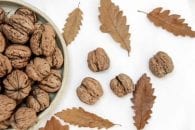Here’s our list of favorite nuts, ranked by their nutrient density. These varieties contain the most protein, fiber, B-vitamins, calcium, minerals, and vitamin E for the least amount of saturated fat:
- Almonds
- Filberts (hazelnuts)
- Peanuts
- Chestnuts
- Pistachios
- Walnuts
- Cashews
- Pecans
- Macadamias
Almonds. Our “Top Nut” award goes to the almond. Here are the main nutrients in one ounce of almonds (a medium-size handful):
- 166 calories
- 5 grams of protein
- 14 grams of fat (90 percent unsaturated)
- 4 grams of fiber (the highest fiber content of any nut or seed), unblanched
- 80 milligrams of calcium
- 1.4 milligrams of zinc
- 1 milligram of iron
- 6.7 milligrams of vitamin E
- some B-vitamins, minerals, and selenium
Filberts, (hazelnuts) because they are high in the amino acid tryptophan, are a good nut for sleep. Almonds and filberts have the most vitamin E (6.7 milligrams per ounce) – nearly 25 percent of the adult recommended dietary allowance.
NUTRITIP: Sleep Nuts
Eating a small handful of nuts as a before-bedtime snack may help you catch more Z’s. Some nuts and seeds, especially whole filberts and ground sesame seeds, have a high amount of the sleep-inducing amino acid tryptophan.
Walnuts have the greatest concentration of omega-3 fatty acids.
Chestnuts are lowest in fat, containing only about 10 percent as much fat as other nuts. What little fat is in the chestnut (1.3 grams per ounce) is nearly all the unsaturated type. Chestnuts also contain three grams of fiber per ounce, but they are relatively low in protein.
Soybean nuts and peanuts are not really nuts at all. They are legumes, and they come from plants rather than trees. Both are very nutritious. Soybean nuts, while less popular because of their less appealing taste, are actually the most nutritious nut. A quarter cup of soybean nuts contains a similar number of calories to other nuts, yet packs the following nutrients:
- 17 grams of protein
- 9 grams of fat (90 percent unsaturated)
- 3.5 grams of fiber
- 138 milligrams of folic acid (33 percent of the DV)
- 116 milligrams of calcium (10 percent of the DV)
- 2 milligrams of zinc (around 15 percent of the DV)
- 1.7 milligrams of iron (10 percent of the DV)
- 19 micrograms of selenium
When purchasing soybean nuts, avoid those that are roasted in “hydrogenated” or “partially hydrogenated” oils.

